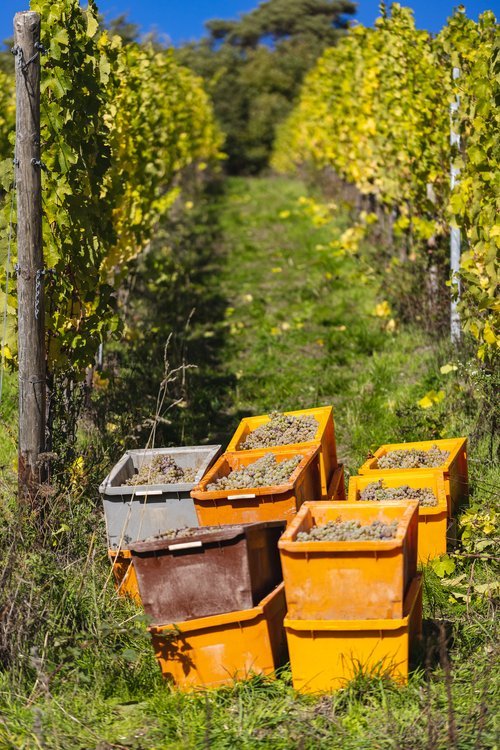Sybille Kuntz
Mosel, Germany
We’re venturing into the new, albeit well-charted German territory with Sybille Kuntz’ range of pristine biodynamic wines. Their introduction to our portfolio is as fortuitous as it was highly anticipated. We are enthralled by the calibre of new age producers like Sybille Kuntz who are shaking up the oh-so -traditional, noble Mosel. So, when presented with the opportunity to sample her remarkable Trockenbeerenauslese, we were awestruck by the breadth and depth her wines offer.
Sybille is one of few German winemakers who’ve mastered their estate and in doing so, captured the Mosel’s essence so vividly. In the space of 30 years, Sybille Kuntz has gained renown and is praised for producing polished Rieslings. In 2011, Sybille and her husband Markus expanded their seminal dry-style Riesling range, to a full-encompassing portfolio of wines that encapsulate the whole spectrum of traditional German viticulture, from Qualitätswein to Trockenbeerenauslese.
Organic since 1990 and organic certified (“Bio-Weingut”) since 2013, Sybille composes with strictly small yields produced from vines averaging 45 to 80 years of age. The consecrated ground of their Niederberg-Helden vineyard in the town of Lieser, situated in the middle of the Mosel, is at the heart of their production, which has been certified biodynamic since 2016.
This selection is what we feel is the most representative of Sybille Kuntz’ status as a high profile Mosel producer, and the few back vintage releases we have secured are a testament to that.
2022 Riesling Trocken
The Qualitätswein Riesling is the first to be harvested. The plots are in Lieser and Kues, planted with young vines of up to 40 years of age. The slope has 30-50% inclination, the soil is a mix of slate and a little bit of quartz. As part of their biodynamic practices, they cultivate a spontaneous cover crop between rows, which sustains a healthy microbial balance. Low yield is assured through the pruning of the vines to 8–10 buds/vine. At the end of June, shortly after flowering, manual shoot thinning is performed along with leaf and secondary shoot removal from the fruit zone.
Tasting Notes:
“Gosh! So chock-full of wild-flower (biodynamic) flavours. Really beautiful. Gorgeous already. Vital and unlike the Mosel Rieslings of old (more potent and drier) but such a well-balanced joy. Intense but not heavy. Great to drink with or without food. But probably not for the very long term. Drink 2021-2028” 17/20 Jancis Robinson
Featured in Financial Times Article: “Jancis Robinson’s best white wines for Christmas 2020”
2022 Kabinett Riesling Trocken
Kabinett forms the basis of the superior Qualitätswein mit Prädikat category, as defined by the German Wine Law. It is produced mainly from old vines grown in the steep vineyards of Pauls Valley, a side valley carved by the River Moselle some thirty-five thousand years ago. Today, it is part of the celebrated single vineyard site Lieser Schlossberg. It is harvested a little later than the Qualitätswein to produce this dry, aromatic and elegant wine.
Sybille has propelled herself to the top of Riesling production in the German wine industry. In 2016, Weingut Sybille Kuntz was Demeter certified biodynamic.
Tasting Notes:
“A miracle of concentration and extract. Perhaps not the delicate flower of a typical Kabinett but gosh it's chock-full of flavour! Almost more tropical flowers than wild flowers. Really sets the cat among the pigeons of, classical Mosel. But that's presumably climate change for you. Fabulous wine that qualifies as off dry and is hugely emphatic”.
17/20 Jancis Robinson
2022 Spätlese Riesling Trocken
Spätlese (“late harvest”) is, as its designation indicates, picked late, usually at the end of October, in the Niederberg-Helden Einzellage in Lieser. The old vines, planted in the middle of the last century, are partly ungrafted. The grapes benefit from a long ripening period, hence a higher sugar content and aromatic potency at harvest. An archetype of density and expression, this is a truly excellent wine.
Tasting Notes:
“You could think of this as Sybille Kuntz‘s Grosses Gewächs. Deep gold. Both intense and vibrant on the nose. Pure ripe Riesling with a hint of hazelnuts. Certainly no lack of acidity even after this hot summer – an almost painful level. Real tension and excitement on the palate. Still quite youthful and unevolved but promising much with a smoky undertow, the way that Clos Ste Hune has. Real energy here and the alcohol is well contained. Drink 2022-2030.” 17.5/20 Jancis Robinson
2019 Auslese Riesling Feinherb
The 2019 vintage is described as the second consecutive summer of the century. It produced fantastic Rieslings with exceptional aging potential. The warm growing season, which was marked by dry periods during the summer, provided outstanding ripening conditions. The cool autumn nights during the harvest ensured excellent aroma profiles and balanced, resolved acidity levels. Due to the high temperatures during the summer months, the berries stayed rather small and had a lower juice to skin ratio, thus a great intensity across all quality levels up to Beerenauslese.
Winemaking:
The grapes are picked from the best and oldest vineyard parcels of the Niederberg-Helden Einzellage. The low yield of these vineyards results in a high concentration of aroma and taste. The steepest vineyards grown on stony slate soil produce these rich Riesling wines that stand out for their minerality and concentration.
Tasting Notes:
“Pale gold with green highlights. Hints of golden syrup on the nose – really rather luscious. This is surely a difficult wine to grow and make but it‘s also one of those medium-sweet wines that I find difficult to fit into my drinking schedule. Too sweet and serious to be an aperitif, and too sweet to match to many savoury foods (creamy paté?) but not sweet enough to drink with sweet food. Very admirably made but perhaps more forward than the sort of fruity wine the old guard of German wine lovers bought, aged and appreciated? Well made. I am looking a gift horse in the mouth, clearly. Drink 2021-2028.” 16.5/20. Jancis Robinson
2019 Beerenauslese Riesling (750mL)
This rare Riesling is not available in every vintage. It is undeniably the very best that Mosel Riesling grapes are able to bring forth. These wines have built the world-wide reputation of Mosel Rieslings. For centuries these wines have been much sought after, because their concentration, aroma and expressiveness make them unique in the world. They have virtually unlimited ageing potential.
Winemaking:
The Beerenauslese is the next step up from the Auslese level. It’s made of a selection from fully ripe and sun-dried grapes, selected on site by hand, one by one and deposited into seperate boxes. The grapes are grown on the Niederberg-Helden, a single vineyard site (designated an Erste Lage or “First Growth“ site). The vines were planted in the 1920’s and are mostly ungrafted. At 70% steepness the midday sun is positioned almost vertically above the vines and the Mosel River reflects the sun with mirror-like intensity. This causes the dehydration of the grapes into raisins.
Tasting Notes:
“Pale gold. Amazing to achieve this ripeness level and this alcohol level. Very intense, tightly wound, introvert nose. Wonderfully pure, chiselled and lively though quite wild with many a note of wild flowers. Perhaps the 2019 from Sybille Kuntz that most obviously demonstrates her commitment to biodynamic viticulture. Not opulently rich but very precise and refreshing. Drink 2023-2032.” 17/20 Jancis Robinson
2011 Trockenbeerenauslese (750mL)
The 2011 vintage was one of the best of this century. All quality levels from Qualitätswein to Kabinett and all the way to Beerenauslese and Trockenbeerenauslese demonstrated excellence that year. The growing season was a very long one, with a cool spell in the summer but a very warm September and a magic, golden October. However, they experienced a moment of anxiety on the 26th of August, when a heavy hail storm hit their vineyards just after the completion of green harvest. The next day, they deployed their expert pickers to remove the damaged berries. Luckily, a warm September and sunny October followed. The resulting low yields of beautifully ripe grapes produced a powerful, ripe and elegant wine with a balanced and delicate acidity.
Winemaking:
The Trockenbeerenauslese is the final step in the quality pyramid. The hand selected raisins are so dry that you can hear them when they’re placed into the crates.
Hand-picked from the Auslese and Beerenauslese grapes from Niederberg-Helden, the sun-dried raisins are pressed separately. These wines have extreme density and sweetness and the very best what Mosel Riesling is able to yield. They are, in fact, unique in the wine world. The Trockenbeerenauslese has a fantastic aging potential and guarantees pure pleasure.
Tasting Notes:
Orangey gold – looks quite unctuous. Wonderfully pure botrytis. Crystallised apricots. Sweet and lots of acidity and a bit of sulphur. But it's all set for a great future. Brava! 18/20 Jancis Robinson, Jancis Robinson
“Viscous, buttery and rich, with a surplus of brioche, cream, ripe pineapple, dried apricot and peach flavours that are balanced and fresh. Quite voluptuous, featuring a luscious finish filled with ginger and spice. Drink now through 2045”. Wine Spectator














